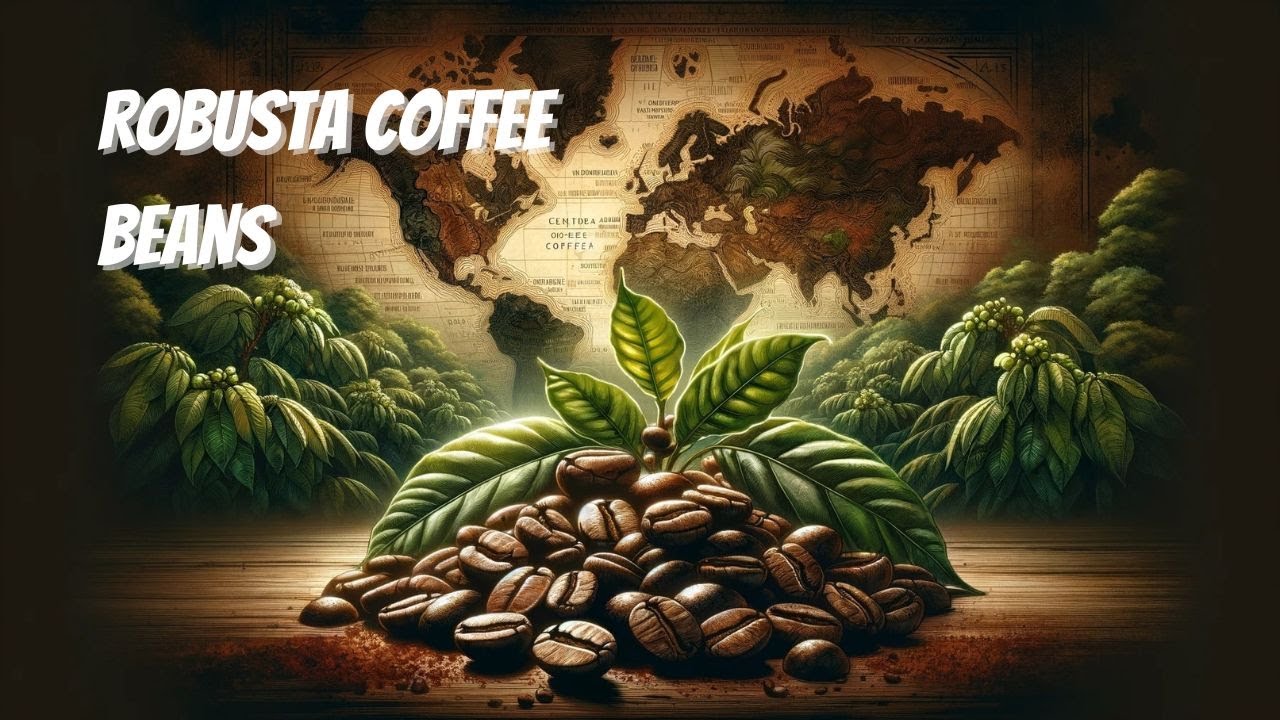Robusta coffee, scientifically known as Coffea canephora, is one of the two main species of coffee beans, alongside Arabica (Coffea arabica). While Arabica is often celebrated for its complex flavors and aromatic qualities, Robusta is frequently associated with its strong, bold taste and higher caffeine content. Despite being sometimes overshadowed by Arabica, Robusta plays a crucial role in the global coffee industry. This article provides an in-depth look at Robusta, exploring its history, cultivation, characteristics, uses, and impact on the coffee market.

History and Origin
Robusta coffee originates from sub-Saharan Africa, particularly in countries like Uganda and the Democratic Republic of Congo. The robust and resilient nature of Robusta plants allows them to withstand higher temperatures and more significant fluctuations in weather, making them suitable for cultivation in various regions around the world.
Cultivation and Production
Robusta coffee is predominantly grown in regions with low altitudes (200-800 meters above sea level) and high temperatures (24-30°C). It is more resistant to pests and diseases, such as coffee leaf rust and coffee berry disease, which makes it a preferred choice for many farmers, particularly in areas where these issues are prevalent.
Major Robusta coffee-producing countries include:
- Vietnam: Vietnam is the largest producer of Robust, contributing to approximately 40% of the world’s supply. The country’s favorable climate and extensive coffee farming infrastructure make it ideal for large-scale Robusta cultivation.
- Brazil: As the world’s largest coffee producer, Brazil grows both Arabica and Robusta. The Robusta beans from Brazil are often used in blends and instant coffee production.
- Indonesia: Known for its rich volcanic soil, Indonesia produces high-quality Robusta beans with distinct flavor profiles.
- India: India is another significant producer, with its Robusta often used in espresso blends due to its strong, full-bodied characteristics.
Characteristics of Robusta Coffee
- Flavor Profile: Robusta is known for its strong, bold taste with a more pronounced bitterness compared to Arabica. Common flavor notes include chocolate, nutty, and earthy tones, often with a grainy or woody aftertaste.
- Caffeine Content: Robusta beans contain almost dingdongtogel twice the caffeine content of Arabica beans, ranging from 2.2% to 2.7%. This higher caffeine level contributes to its bitterness and acts as a natural pest deterrent.
- Acidity: Robusta generally has lower acidity compared to Arabica, making it less fruity and more robust in flavor.
- Crema Production: In espresso preparation, Robusta beans are prized for their ability to produce a thick, rich crema, the creamy layer on top of an espresso shot. This quality makes Robusta a popular choice for espresso blends.
- Physical Appearance: Robusta beans are typically rounder and smaller than Arabica beans, with a straighter and more central crease.
Uses of Robusta Coffee

Robusta coffee’s unique characteristics make it suitable for various applications in the coffee industry:
- Espresso Blends: The strong flavor and crema-producing qualities of Robusta make it an essential component in many espresso blends. It adds body and intensity, complementing the more delicate flavors of Arabica.
- Instant Coffee: Due to its cost-effectiveness and strong flavor, Robusta is widely used in the production of instant coffee. Its high caffeine content and bold taste make it ideal for this purpose.
- Commercial Coffee Blends: Many commercial coffee blends incorporate Robusta to enhance flavor and provide a consistent taste profile. It helps lower the cost of production while maintaining a robust flavor.
- Traditional Coffee Preparations: In some cultures, particularly in Southeast Asia, Robusta is preferred for traditional brewing methods. For instance, Vietnamese coffee often uses Robusta beans brewed with a drip filter and served with sweetened condensed milk.
Economic Impact and Market Trends
The cultivation and trade of Robusta coffee have significant economic implications, particularly in developing countries where it serves as a primary source of income for millions of farmers. The global coffee market heavily relies on Robusta due to its affordability and high yield.
- Price Stability: Robusta is generally less expensive to produce than Arabica, contributing to its price stability. This affordability makes it an attractive option for large-scale coffee producers and consumers seeking budget-friendly coffee options.
- Demand and Supply: The demand for Robusta continues to grow, driven by the increasing popularity of espresso-based beverages and instant coffee. As a result, countries like Vietnam and Brazil have expanded their Robusta production to meet global demand.
- Sustainability: The robust nature of Robusta plants makes them more resilient to climate change and pests, which is increasingly important as the coffee industry faces environmental challenges. Efforts to improve sustainable farming practices for Robusta are underway, aiming to enhance productivity while minimizing environmental impact.
Health Benefits and Considerations

Robusta coffee, like all coffee, offers several health benefits when consumed in moderation:
- Antioxidants: Robusta coffee is rich in antioxidants, which help protect the body from oxidative stress and reduce the risk of chronic diseases.
- Caffeine Boost: The higher caffeine content in Robusta can provide an energy boost, improve focus, and enhance athletic performance.
- Liver Health: Regular coffee consumption, including Robusta, has been linked to a lower risk of liver diseases, such as liver cirrhosis and liver cancer.
However, it is essential to consider the following:
- Bitterness: The strong, bitter taste of Robusta may not appeal to everyone, particularly those who prefer the milder flavors of Arabica.
- Caffeine Sensitivity: Individuals sensitive to caffeine should consume Robusta in moderation due to its higher caffeine content, which can lead to insomnia, jitters, and increased heart rate.
Conclusion
Robusta coffee, with its bold flavor, high caffeine content, and resilience, plays a vital role in the global coffee industry. Its unique characteristics make it suitable for various applications, from espresso blends to instant coffee. As the demand for coffee continues to grow, Robusta’s economic and environmental advantages ensure its importance in the market.
Read More Article About “Brain Health: Strategies for a Sharp and Healthy Mind“



